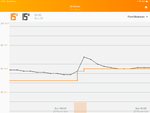We had smart meters fitted in august, took a while to have accurate costs visible on the in house display but now it’s accurate as to how much is being used at specific times and what it’s costing, took a couple of months to get a smart reading each month so I can see exactly where we are, now an automatic reading on the 19th every month is sent by gas and electric I can send extra readings at any time I like that gives me a constant costing so I can see where we stand as to how we stand as to if in credit or getting behind, thus far we have been in credit constantly and paying less than before the price jump, we use as we need but we just don’t waste.
BP
BP



